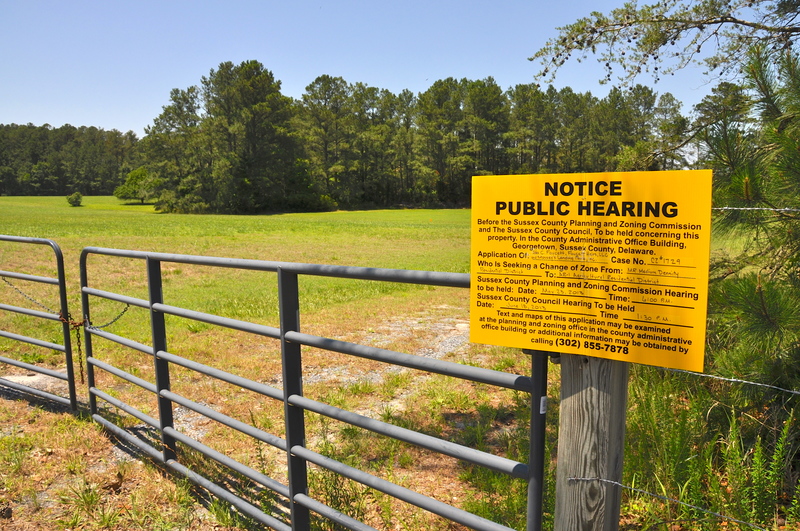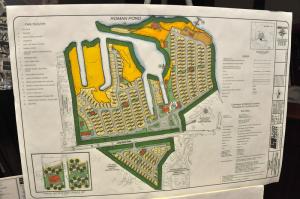There are two sides to most land-use applications considered by Sussex County officials.
But few offer the contrasts the proposed Castaways at Massey's Landing RV campground offers.
The applicants' representatives say the location at the end of Long Neck Road is an ideal spot for a campground; opponents say the project would benefit only tourists and the owners and insist all development in the area should be residential. The parcel was approved for a 120-unit housing project in 2007.
The applicants say a 2005 traffic study shows Long Neck Road can handle additional traffic, which would be minimal at best; opponents say the study is outdated and does not reflect what is actually occurring on Long Neck Road.
Proponents say the project would provide jobs and promote tourism, which are important elements in the county's comprehensive land-use plan. Opponents say the project does not enrich the surrounding area.
And it goes on and on. The applicants and residents have had to sit through a pair of 4-hour hearings; testimony concluded at the end of county's council's June 18 marathon hearing. Council cannot act on the applications until planning and zoning commissioners offer a recommendation. Planning and zoning commissioners could vote on the applications during a Thursday, June 27 meeting.
About the only thing the two sides agree on is that the 51-acre parcel is in a county growth zone; however, they disagree how the land should be used.
“Not only is this area appropriate, it's ideal for this use,” said Jim Fuqua, the applicant's attorney, adding the project is in-fill development.
In contrast, a petition with more than 960 people in opposition to the project has been presented to the county.
Mary Schrider-Fox, an attorney representing Massey's Landing Park homeowners, said what appears as a down zoning – from MR to AR-1 – is deceiving. “You might think it's a good idea if it were a less intense use, but that is not the case here,” she said. “It's not a permitted use; it needs conditional-use approval. An RV park is a more intense use of the site than 120 housing units versus a commercial venture.”
Massey's Landing Park, which is adjacent to the proposed campground, is owned by the developer's family.
Fox said the area around the proposed campground is manufactured home parks. “This would not be part of the development trend of the area,” she said. “Tourism is important, but the wellbeing of residents should not take a back seat.”
Two applications are being considered
The developers, Ida Faucett and Ida Faucett Heirs LLC and Massey's Landing Park Inc., have filed applications for a zoning change on a 51-acre parcel from MR, medium-density residential, to AR-1, agricultural residential, and a conditional-use to allow the campground. A campground is not permitted in MR zoning. The developers plan to keep the property in Faucett family ownership as a multigenerational land-use project.
The proposed campground at the end of Long Neck Road would contain 322 RV sites and 10 remote tent camping sites. Planned amenities include a swimming pool; pavilions; general store; welcome center; dog park; cafe and snack bar; bath houses; nature center; two lodges; fishing and crabbing piers; rental center for golf carts; DART bus stop; and a rental center for kayaks, canoes and other nonmotorized watercraft.
The zoning change is needed because campsites are not permitted in MR zoning districts. The parcel was approved in 2007 for a 120-unit medium-density, residential planned community including duplexes and single-family homes. That plan, which included a zoning change from AR-1 to MR, was abandoned when the housing market declined. “There is no demand for these types of homes,” Fuqua said.
When a dwelling is not a dwelling
Another area of concern expressed by opponents to the project is the proximity of RV sites to existing manufactured homes. Because, under county code, a manufactured home is not considered a dwelling, the developers are not required to follow regulations dictating that campsites be at least 400 feet from a dwelling.
Campsites are planned near the 50-foot border around the perimeter of the campground.
Fox said county code contradicts itself when defining what a manufactured home is, but even that should not be the determining factor in planning the campground. Fox said the county's land-use plan promotes affordable housing, such as manufactured homes. “You should not ignore the fact that the sites would be 50 feet away from residents. These homes and residents are not any less important; the spirit of the code is not being honored. The RV sites are just too close to residential neighbors.”
Jeff Marks, vice president of the Massey's Landing Homeowners Association, said the definition of a dwelling is not clear in the county's code. “This raises an equal protection issue because age is a protected class under law,” he said.
The average age of a resident along Long Neck Road is 62 years of age, he said.
“We are taxpayers, and we are voters, and we cannot be treated this way,” said Pot Nets Lakeside Homeowners Group President Betty Greenwalt. “These are our homes if you consider them dwellings or not.”
Seasonal rentals not part of the plan
Castaways at Massey's Landing would be operated by the same company that operates a 378-site RV campground near Berlin, Md.
Kathleen Walsh, chief operating officer, would manage the Massey's Landing campground if the applications are approved. “A lot of the concerns expressed here are my concerns,” she said.
She said she has experience with traffic and getting RVs checked in quickly to avoid potential backups. She also said she has experience with evacuation procedures, having dealt with evacuations caused by hurricanes Irene and Sandy. “Because the bridge [Chesapeake Bay Bridge] closes when winds reach 35 to 40 mph, we have to get people out before winds increase,” she said.
She added that most people at the Ocean City campground use bus service. “They do not drive back and forth,” she said.
The proposed park, split by Long Neck Road, would be bordered by Massey's Landing Park and Pot Nets Seaside on the south side and Pot Nets at Dockside and Roman Pond on the north side.
The campground would have central sewer and water; 50-foot buffers would surround the perimeter; and the park would use the latest green technology for stormwater management. Each site would have electric, water and sewer hookups, and no storage buildings would be permitted, said Jeff Clark, a landscape architect with Land Tech Planning.
Seventy-five employee parking spaces are included on the site plan.
The park would offer weekly, not seasonal, rentals, Clark said. Thirty-eight park models would be available for rent; they would be moved after 180 days and stored for the winer in a central location in the park. No storage of RVs would be permitted. Clark said all sites would be built at one time with no phased-in construction.
“RV parks have drawn a lot of attention,” Fuqua said. “All have a right to comment, but this is not a popularity contest nor a public referendum or how people feel. It has to based on evidence as a land-use decision. Concerns were considered and addressed during planning for the project in compliance with the comprehensive land-use plan.”
Fox said officials need to consider what kind of growth is appropriate in the area. She said 322 RV sites is not what the county's comprehensive land-use plan envisions.
Consultants dispute project's impact on traffic
Traffic, which surfaced as one of the hot-button issues during the May 23 planning and zoning hearing, was an equally contentious issue during the county council hearing.
Jim Fuqua, the applicants' attorney, said a 2005 traffic impact study was deemed appropriate by the Delaware Department of Transportation; DelDOT officials said there had been no significant change to merit another study.
“Conditions have not changed substantially, and the study included 11 developments to be built in the future,” Fuqua said. “And there would be similar trip generation based on the RV park we are proposing.”
Mike Riemann, a traffic consultant for the applicants, backed up what Fuqua said. “The traffic impact study was required to account for future growth and project what is beyond there today,” he said, adding that large developments were included. Among those were Baywood Greens with 869 lots and The Peninsula with more than 1,400 lots; neither was built at the time of the traffic study.
But traffic consultant Steve Raign for Massey's Landing homeowners refuted statements that no significant change had occurred along Long Neck Road. He said DelDOT's traffic counts show that in 2004, average daily trips numbered just over 7,700 compared to more than 11,400 in 2012, a 47 percent increase. “In my professional opinion there is a significant change in traffic and traffic patterns on Long Neck Road,” he said.
In addition, Raign said, a housing development with 120 units would generate about 1,200 trips per day compared to an RV park with 322 sites that would generate about 2,500 trips per day.
Raign said the 2005 study did not include the Route 24 intersection. “And there are issues at this intersection,” he said. Raign said the 2005 traffic study included development up to 2009; a new study would include all development up to 2014.
“A new study should be done, and any additional improvements that need to be done – the developer should be responsible for that,” Raign said.
“The 8-year-old study is a concern,” Fox said. She said DelDOT's findings are not the only source county officials can use when making a decision. She said the law permits officials to use personal experience as a consideration.
William Higgins, president of three Pot Nets associations, said 10,000 people live along the 5-mile stretch of Long Neck Road in the summer, and 100,000 cars pass through the area on summer holiday weekends. He said adding another 1,000 people plus their vehicles in the congested area would cause more backups and could delay emergency vehicles.
Higgins said, according to Delaware State Police, there were 103 crashes, with one fatality, on Long Neck Road in 2012, or one every three days. “And some closed the road down for as long as two hours,” he said, reminding people that the road is a dead-end road.





















































